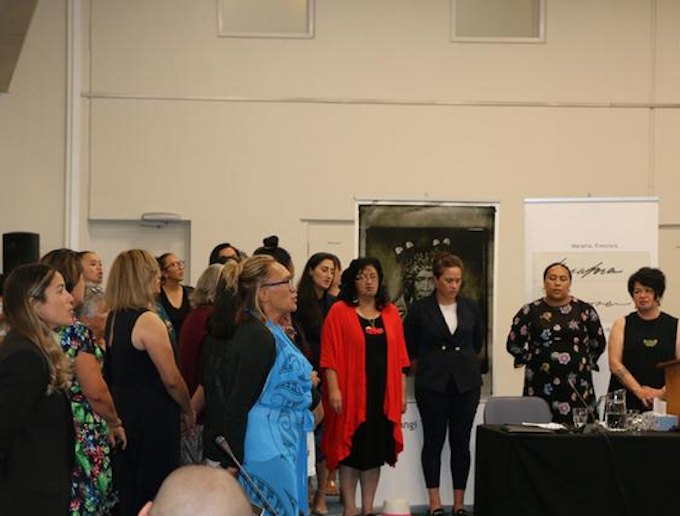
By Māni Dunlop, RNZ News
New Zealand’s Waitangi Tribunal has heard the voices of Māori women have been marginalised for far too long and the impact of colonisation has caused the negation of rights over their bodies, minds, and beliefs.
The Mana Wāhine Inquiry is underway in Kerikeri – it is the first of the pre-hearings – which are exploring the tikanga of mana wāhine and the pre-colonial understanding of wāhine in te ao Māori; of which will set the context for the inquiry.
The inquiry includes a number of wāhine-related claims – but the original claim was made in 1993 by 16 leaders – Dame Areta Koopu, Dame Whina Cooper, Dame Mira Szaszy, Ripeka Evans, Dr Erihapeti Murchie, Dame Georgina Kirby, Dame June Mariu, Violet Pou, Hine Potaka, Dame Aroha Reriti-Crofts, Dr Papaarangi Reid, Donna Awatere-Huata, Lady Rose Henare, Katerina Hoterene, Te Para (Mabel) Waititi, and Kare Cooper-Tate.
Lawyer for the original claim Natalie Coates had said the wāhine had much support behind them from others at the time it was presented in person 28 years ago.
The claim was triggered by the removal of Dame Mira Szaszy from the shortlist of appointees to the Treaty of Waitangi Fisheries Commission.
The inquiry will examine the inherent mana and iho of ngā wāhine Māori; the systemic discrimination, deprivation and inequities experienced by wāhine Māori; and the extent to which the Crown’s conduct in this respect had been, and is, Treaty non-compliant.
Hineahuone was truly present at Turner centre in Kerikeri as claimants, their lawyers, and whānau packed into the room to begin the first pre-hearing of the inquiry.
First to give evidence
One of the original claimants, Ripeka Evans, who also put in a claim on behalf of the hapū and iwi of Te Tai Tokerau alongside Dr Papaarangi Reid, was first to give evidence yesterday.
Fighting back tears, she urged the tribunal to complete the claim in her lifetime – something that some of the original claimants were unable to witness. She said it would be remiss of her to not acknowledge how special this moment was.
After many joined her in acknowledging the significance of the beginning of these hearings, Evans told the tribunal and a packed public gallery – it was “time for business”.
She emphasised the inherent power, authority and status of wāhine in te ao Māori and the role of her tīpuna who signed the Treaty of Waitangi, who she called the founding mothers.
She described the traditional roles of men and women as essential parts of the collective whole, both forming part of the whakapapa that linked Māori to the beginning of the world and women in particular played a key role in linking the past with the present and the future.
Evans provided the historic context of the impact of colonisation.
“The colonial frame in which the colonising culture that looked to men as leaders and chiefs – this caused the negation of wāhine Māori mana motuhake and rangatiratanga over their whenua, taonga, mātauranga, hearts, bodies, minds and beliefs.”
Power, authority and status the bottom lines
She hoped that the inquiry would look at the power, authority and status as the three bottom lines that claimants were there to address at these tūāpapa hearings, to not just talk about, but find solutions for the future.
When asked by the tribunal to go back to what triggered the original claim and the role of the Crown in removing Dame Mira from the shortlist, she talked to the wider context of the Crown’s role in being silence on these particular.
Evans said, although the Crown had provided funding for the inquiry, this was not enough to show they had learnt a lesson after 28 years.
“The fact that we are here today, I have to call it out, the Crown funding for this claim is for the Crown to bring it – not for me – not for the claimants to come and tell their stories.
“It beggars belief that the lesson of the last 28 years his that the Crown has not woken up yet about mana wāhine and about the opportunities that that presents for those big issues.”
“And we are still looking to the tribunal as our ray of hope – we don’t have deep pockets.”
The hearing is set down until Thursday and will hear from more original claimants and other notable wāhine Māori leaders.
This article is republished under a community partnership agreement with RNZ.















































